
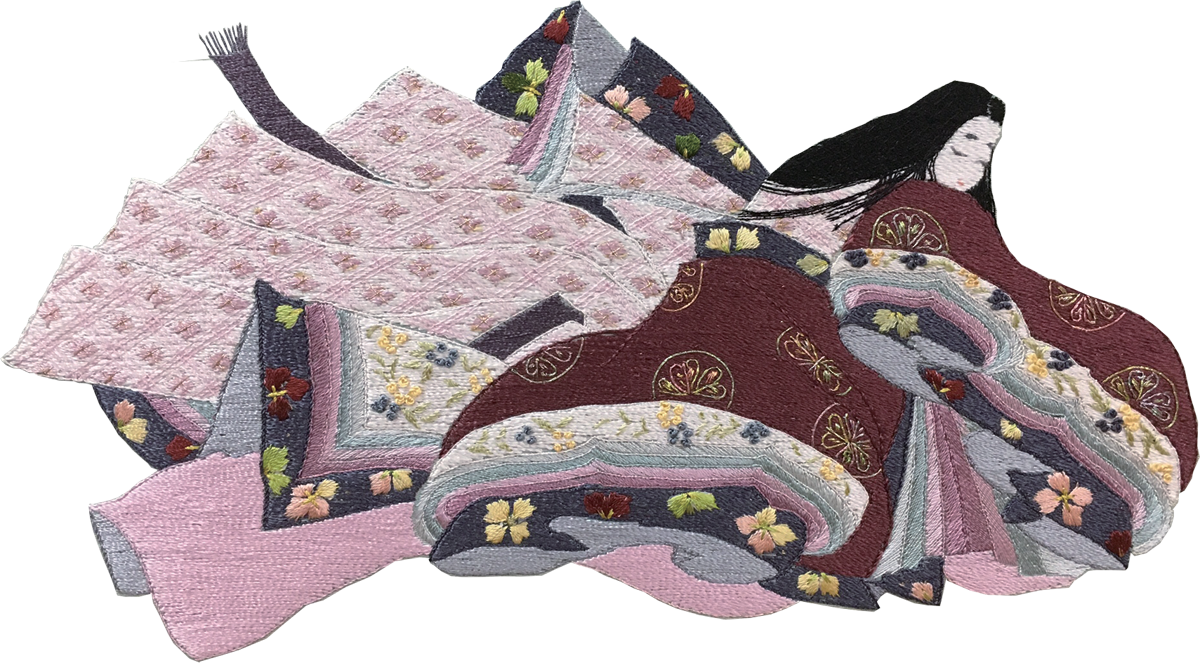

Sanae NeNe

Wakauta
Hyakunin Isshu








Track 1 - Prologue – Dawn
プロローグ あけぼの
Track 2 - Chapter One - Snow Falling On (2 poems)
第一章 露にぬれつつ、雪はふりつつ (二首)
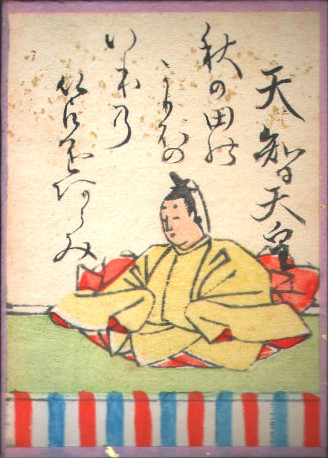
秋の田のかりほの庵の苫をあらみ
わが衣手は露にぬれつつ
田子の浦にうち出でて見れば白妙の
富士の高嶺に雪は降りつつ

aki no ta no
kari-ho no iho no
toma wo arami
wa ga koromo-de ha
tsuyu ni nuretsutsu1
In the autumn fields
the hut, the temporary hut,
its thatch is rough
and so the sleeves of my robe
are dampened night by night with dew.
tago no ura ni
uchi-idete mireba
shiro-tahe no
fuji no taka-ne ni
yuki hafuritsutsu
As I set out on
the beach of Tago, and look,
I see the snow constantly falling
on the high peak of Fuji,
white as mulberry cloth.
Track 3 - Chapter Two - Priest’s Tears (9 poems)
第二章 僧侶の涙(九首)
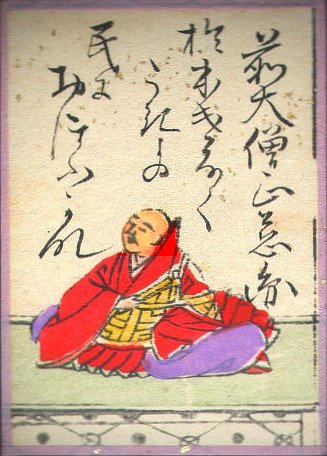
八重むぐら茂れる宿の寂しきに
人こそ見えね秋は来にけり
思ひわび さても命は あるものを
憂きに堪へぬは 涙なりけり
村雨の露もまだ干ぬまきの葉に
霧立ちのぼる秋の夕暮
わが庵は都の辰巳しかぞ住む
世をうぢ山と人はいふなり
おほけなく憂き世の民におほふかな
わが立つ杣にすみ染の袖
嵐吹く三室の山のもみぢ葉は
竜田の川の錦なりけり
夜もすがらもの思ふころは明けやらぬ
ねやのひまさへつれなかりけり
寂しさに宿を立ち出でてながむれば
わたの原漕ぎ出でて見ればひさかたの
雲居にまがふ沖つ白波

yahe mugura
shigereru yado no sabishiki ni
hito koso miene
aki ha kinikeri
To the lonely house
where the weeds, eight layers deep,
have grown rank,
not a soul can be seen —
but autumn, at least, has come.
omohi-wabi
sate mo inochi ha
aru monowo
uki ni tahenu ha
namida narikeri
Miserable,
nonetheless, somehow
I cling to life, but
it is my tears
that cannot endure the pain!
murasame no
tsuyu mo mada hinu
maki no ha ni
kiri tachi-noboru
aki no yufu-gure
While the raindrops of
the passing shower have not yet dried from
near the leaves of the evergreens,
the mist is already rising,
on this evening in autumn.
wa ga iho ha
miyako no tatsu-mi
shika zo sumu
yo wo ujhi-yama to
hito ha ifu nari
My hut is to
the capital’s southeast
and thus I live.
But people call it “Uji, hill
of one weary of the world,” I hear.
ohoke naku
uki yo no tami ni
ohofu kana
wa ga tatsu soma ni
sumi-zome no sode
Inadequate, but
they must shelter the folk
of this wretched world—
my ink-black sleeves, having begun to live
“in this timber-forest that I enter.”
arashi fuku
mimuro no yama no
momijhi-ba ha
tatsuta no kaha no
nishiki narikeri
It’s the autumn leaves
of the hills of Mimuro,
where the tempests blow,
that are the woven brocade floating
on the waters of Tatsuta River!
yomosugara
mono-omofu koro ha
akeyaranu
neya no hima sahe
tsurenakarikeri
All through the night
recently, as I dwell on things,
even the gap between the doors
of my bedroom, which does not lighten,
seems cruel and heartless to me.
sabishisa ni
yado wo tachi-idete nagamureba
idzuku mo onaji
aki no yufugure
When, from loneliness,
I stand up and leave my hut
and look distractedly about:
everywhere it is the same
evening in autumn.
wata no hara
kogi-idete mireba hisakata no
kumowi ni magafu
okitsu shiranami
As I row out into
the wide sea-plain and look
all around me—
the white waves of the offing
could be mistaken for clouds!
Track 4 - Chapter Three - Tales of the Wind (5 poems)
第三章 風物語 (五首)
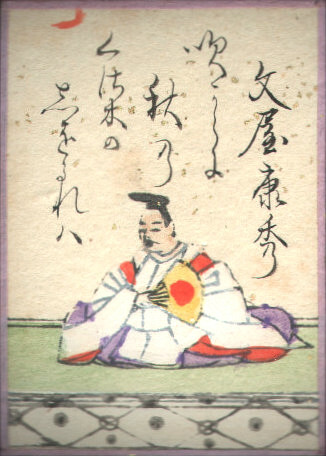
吹くからに秋の草木のしをるれば
むべ山風をあらしといふらむ
夕されば門田の稲葉訪れて
蘆のまろ屋に秋風ぞ吹く
み吉野の山の秋風さよ更けて
ふるさと寒く衣打つなり
風そよぐ楢の小川の夕暮は
御禊ぞ夏のしるしなりける
白露に風の吹きしく秋の野は
つらぬきとめぬ玉ぞ散りける

fuku kara ni
aki no kusaki no
shiworureba
mube yama-kaze wo
arashi to ifuramu
As soon as it blows,
the autumn trees and grasses
droop, and this must be why,
quite rightly, the mountain wind
is called “the ravager.”
yufu sareba
kado-ta no inaba
otodzurete
ashi no maro-ya ni
aki-kaze zo fuku
As evening falls,
through the rice-plants before the gate,
it comes visiting, and rustling
on the reeds of the simple hut—
the autumn wind does blow!
mi-yoshino no
yama no aki-kaze
sa-yo fukete
furu-sato samuku
koromo utsu nari
Fair Yoshino,
the autumn wind in its mountains
deepens the night and
in the former capital,
cold I hear the fulling of cloth.
kaze soyogu
nara no wo-gaha no
yufu-gure ha
misogi zo natsu no
shirushi narikeru
In the evening
when the wind rustles the oaks
at Nara-no-Ogawa,
it is the ablutions that are
the only sign it’s still summer!
shira-tsuyu ni
kaze no fuki-shiku
aki no ta ha
tsuranuki-tomenu
tama zo chirikeru
In the autumn fields
where the wind blows repeatedly
on the white dewdrops,
the gems, not strung together,
do scatter about indeed.
Track 5 - Chapter Four - Flower Alphabet (7 poems)
第四章 花のいろは (七首)
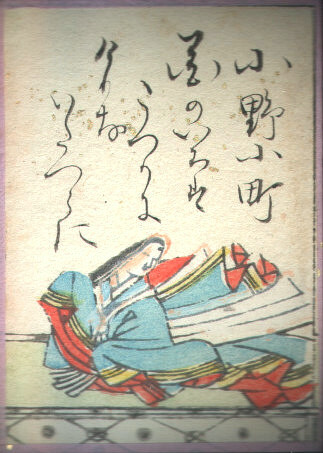
花の色は移りにけりないたづらに
わが身世にふるながめせしまに
春の夜の夢ばかりなる手枕に
かひなく立たむ名こそをしけれ
嘆きつつひとり寝る夜の明くる間は
いかに久しきものとかは知る
あらざらむこの世のほかの思ひ出に
いまひとたびの逢ふこともがな
ながからむ心も知らず黒髪の
乱れてけさはものをこそ思へ
わが袖は潮干に見えぬ沖の石の
人こそ知らねかわく間もなし
玉の緒よ絶えなば絶えねながらへば
忍ぶることの弱りもぞする
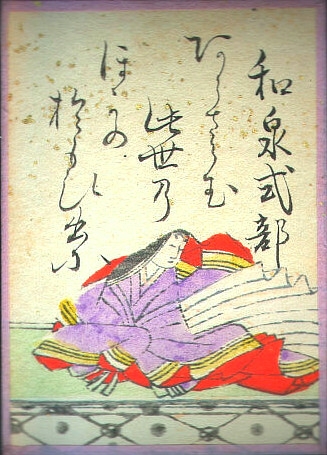
hana no iro ha
utsurinikeri na
itadzura ni
wa ga mi yo ni furu
nagame seshi ma ni
The color of the flowers
has faded indeed
in vain
have I passed through the world
while gazing at the falling rains.
haru no yo no
yume bakari naru
ta-makura ni
kahi naku tatamu
na koso woshikere
With your arm as my pillow
for no more than a brief
spring night’s dream,
how I would regret my name
coming, pointlessly, to ’arm!
nagekitsutsu
hitori nuru yo no
akuru ma ha
ika ni hisashiki
mono to ka ha shiru
The span of time
that I sleep alone, sighing,
until night lightens—
can you at all know
how long that is?
arazaramu
kono yo no hoka no
omohide ni
ima hito-tabi no
afu koto mogana
Among my memories
of this world, from whence
I will soon be gone,
oh, how I wish there was
one more meeting, now, with you!
nagakaramu
kokoro mo shirazu
kuro-kami no
midarete kesa ha
mono wo koso omohe
I do not even know
how long your feelings will last.
My long black hair
is all disheveled and, this morning,
my thoughts too are in a tangle!
wa ga sode ha
shihohi ni mienu
oki no ishi no
hito koso shirane
kawaku ma mo nashi
My sleeves are like
the rock in the offing that
can’t be seen even at low tide,
unknown to anyone, but
there’s not a moment they are dry.
tama no wo yo
taenaba taene
nagaraheba
shinoburu koto no
yohari mo zo suru
O, jeweled thread of life!
if you are to break, then break now!
For, if I live on,
my ability to hide my love
will most surely weaken!
Track 6 - Chapter Five - Passionate Night (12 poems)
第五章 情熱の夜 (十二首)
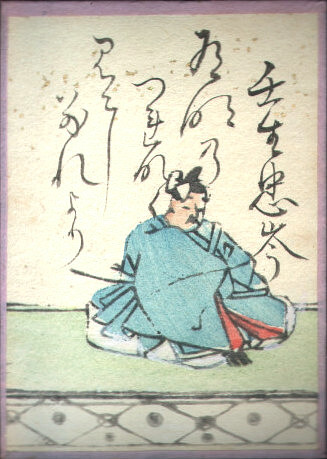
わびぬれば今はたおなじ難波なる
みをつくしても逢はむとぞ思ふ
恋すてふわが名はまだき立ちにけり
人知れずこそ思ひそめしか
あはれともいふべき人は思ほえで
身のいたずらになりぬべきかな
住の江の岸に寄る波よるさへや
夢の通ひ路人目よくらむ
由良の門を渡る舟人かぢを絶え
ゆくへも知らぬ恋のみちかな
今はただ思ひ絶えなむとばかりを
人づてならでいふよしもがな
御垣守衛士のたく火の夜は燃え
昼は消えつつものをこそ思へ
明けぬれば暮るるものとは知りながら
なほ恨めしき朝ぼらけかな
陸奥のしのぶもぢずりたれゆえに
乱れそめにしわれならなくに
逢ふことの絶えてしなくはなかなかに
人をも身をも恨みざらまし
有明のつれなく見えし別れより
暁ばかり憂きものはなし
来ぬ人を松帆の浦の夕なぎに
焼くや藻塩の身もこがれつつ

wabinureba
ima hata onaji
naniha naru
miwotsukushite mo
ahamu to zo omofu
Miserable,
now, it is all the same.
Channel-markers at Naniwa—
even if it costs my life,
I will see you again!
kohi su tefu
wa ga na ha madaki
tachinikeri
hito shirezu koso
omohi-someshika
My name already
is bandied about with
rumors I’m in love—
though, unknown to anyone, I thought,
I had only just begun to love her!
suminoe no kishi ni yoru nami yoru sahe ya yume no kayohi-jhi hitome yokuramu
Not one person who would
call my plight pathetic
comes at all to mind,
and so, uselessly
I must surely die!
suminoe no
kishi ni yoru nami
yoru sahe ya
yume no kayohi-jhi
hitome yokuramu
Must you so avoid others’ eyes
that not even at night,
along the road of dreams,
will you draw nigh like the waves
to the shore of Sumi-no-e Bay?
yura no to wo
wataru funa-bito
kajhi-wo tae
yukuhe mo shiranu
kohi no michi kana
Like a boatman, crossing
the Strait of Yura,
whose oar-cord has snapped,
I’m lost and know not my way
on the road of love!
ima ha tada
omohi-taenamu
to bakari wo
hito-dzute narade
ifu yoshi mogana
Now, the only thing
I wish for is a way to say
to you directly
—not through another—
“I will think of you no longer!”
mi-kaki-mori
weji no taku hi no
yoru ha moe
hiru ha kietsutsu
mono wo koso omohe
Like the fire the guardsman kindles,
guarding the imperial gates:
at night, burning,
in the day, exhausted,
over and over, so I long for her.
akenureba
kururu mono to ha
shiri-nagara
naho urameshiki
asaborake kana
Because it has dawned,
it will become night again—
this I know, and yet,
ah, how hateful it is—
the first cold light of morning!
michinoku no
shinobu mojhi-zuri
tare yuwe ni
midare-somenishi
ware naranaku ni
Whose fault is it
that my feelings have begun to tangle
like the tangle-patterned prints
of Shinobu from the distant north?
Since it is not mine, it must be...
afu koto no
taete shi naku ha
naka-naka ni
hito wo mo mi wo mo
uramizaramashi
If there were no such thing
as ever having met her, then,
contrary to all expectations,
neither her coldness nor my pain
would I have to resent!
ariake no
tsurenaku mieshi
wakare yori
akatsuki bakari
uki mono ha nashi
There is nothing so depressing
as the break of day and
leaving you after
having seen the heartless
morning moon.
konu hito wo
matsuho no ura no
yufu-nagi ni
yaku ya mo-shiho no
mi mo kogaretsutsu
For the man who doesn’t come
I wait at the Bay of Matsuo—
in the evening calm
where they boil seaweed for salt,
I, too, burn with longing!
Track 7 - Chapter Six - Unrequited Love (4 poems)
第六章 片思い (四首)
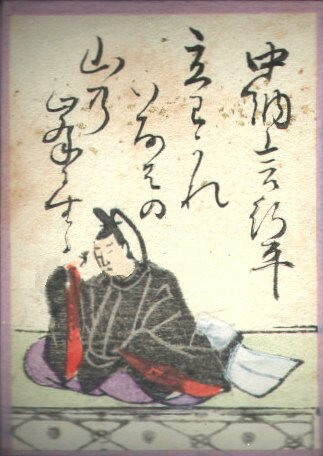
かくとだにえやは伊吹のさしも草
さしも知らじな燃ゆる思ひを
君がため惜しからざりし命さへ
長くもがなと思ひけるかな
立ち別れいなばの山の峰に生ふる
まつとし聞かば今帰り来む
契りきなかたみに袖をしぼりつつ
末の松山波越さじとは

kaku to dani
e ya ha ibuki no
sashimo-gusa
sa shimo shiraji na
moyuru omohi wo
Can I even say
“I love you this much”?—No, and so
you do not know of it
anymore than of the sashimo grasses of
Ibuki,
my burning love for you!
kimi ga tame
woshikarazarishi
inochi sahe
nagaku mogana to
omohinuru kana
Even the life that
I’d not have been sorry to lose
just to meet you once,
now, having met, I think:
“I want it to last forever!”
tachi-wakare
inaba no yama no
mine ni ofuru
matsu to shi kikaba
ima kaheri-komu
Even if I depart
and go to Inaba Mountain,
on whose peak grow
pines, if I hear you pine for me,
I will return straightway to you.
chigiriki na
katami ni sode wo
shiboritsutsu
suwe no matsu-yama
nami kosaji to ha
But we promised!
while wringing out the tears from
each other’s sleeves,
that never would the waves wash over
Sue-no-Matsu Mountain.
Track 8 - Chapter Seven - Falling Blossoms (6 poems)
第七章 花の散るらむ (六首)
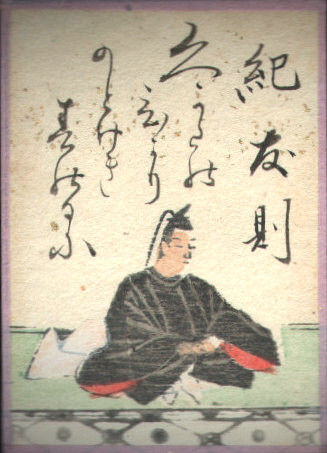
わたの原八十島かけて漕ぎ出でぬと
人には告げよ海人の釣船
長らへばまたこのごろやしのばれむ
憂しと見し世ぞ今は恋しき
滝の音は絶えて久しくなりぬれど
名こそ流れてなほ聞こえけれ
世の中は常にもがもな渚漕ぐ
海人の小舟の綱手かなしも
ひさかたの光のどけき春の日に
しづ心なく花の散るらむ
もろともにあはれと思え山桜
花よりほかに知る人もなし
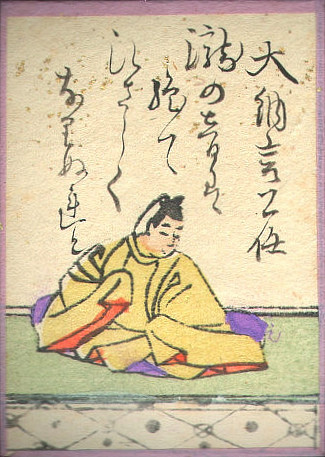
wata no hara
yaso shima kakete
kogi-idenu to
hito ni ha tsugeyo
ama no tsuri-bune
O tell her,
at least, that I’ve rowed out, heading towards
the innumerable isles
of the ocean’s wide plain,
you fishing boats of the sea-folk!
nagaraheba
mata kono goro ya
shinobaremu
ushi to mishi yo zo
ima ha kohishiki
If I live on longer,
shall I again, I wonder,
yearn for these days?
The world that I once saw as
bitter, now, is dear to me!
taki no oto ha
taete hisashiku
narinuredo
na koso nagarete
naho kikoekere
Although the sound of
the waterfall has ceased,
and that long ago,
its name, indeed,
has carried on and is still heard!
yo no naka ha
tsune ni mogamo na
nagisa kogu
ama no wo-bune no
tsunade kanashi mo
If only this world
could always remain the same!
The sight of them towing
the small boats of the fishermen who row in
the tide is touching indeed!
hisakata no
hikari nodokeki
haru no hi ni
shidzu-kokoro naku
hana no chiruramu
In these spring days
with the tranquil light encompassing
the four directions
why should the blossoms scatter
with uneasy hearts?
morotomo ni
aware to omohe
yama-zakura
hana yori hoka ni
shiru hito mo nashi
Let us think of each
other fondly,
O mountain cherries!
for, outside of your blossoms,
there’s no one who knows my feelings.
Track 9 - Intermission
インターミッション〜敷島の道
Track 10 - Chapter Eight - Love Stories of Afusaka (13 poems)
第八章 逢坂ラブストーリー (十三首)
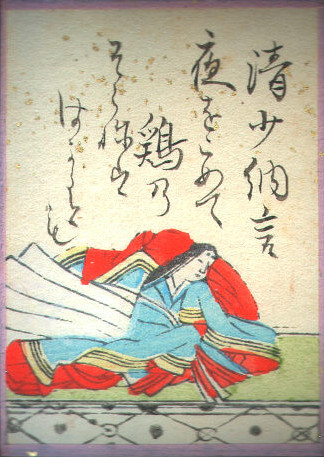
難波江の蘆のかりねのひとよゆゑ
身を尽くしてや恋ひわたるべき
めぐり逢ひて見しやそれとも分かぬ間に
雲隠れにし夜半の月影
忘らるる身をば思はず誓ひてし
人の命の惜しくもあるかな
恨みわび干さぬ袖だにあるものを
恋に朽ちなむ名こそ惜しけれ
夜をこめて鳥のそら音ははかるとも
よに逢坂の関は許さじ
やすらはで寝なましものをさ夜更けて
かたぶくまでの月を見しかな
有馬山猪名の篠原風吹けば
いでそよ人を忘れやはする
大江山いく野の道の遠ければ
まだふみも見ず天の橋立
見せばやな雄島の海人の袖だにも
濡れにぞ濡れし色は変はらず
忘れじのゆく末まではかたければ
今日を限りの命ともがな
音に聞く高師の浜のあだ波は
かけじや袖のぬれもこそすれ
難波潟短き蘆のふしの間も
逢はでこの世を過ぐしてよとや
いにしへの奈良の都の八重桜
けふ九重に匂ひぬるかな

naniha-e no
ashi no kari-ne no
hito-yo yuwe
miwotskushite ya
kohi-wataru-beki
Due to that single night
of fitful sleep, short as a reed’s joint cut at
the root,
from Naniwa Bay,
am I to exhaust myself, like the channel-
markers,
passing my days in longing?
meguri-ahite
mishi ya sore tomo
wakanu ma ni
kumo-gakurenishi
yoha no tsuki-kage
As I was wondering
whether or not I had seen it
by chance,
it became cloud-hidden,
the face of the midnight moon!
wasuraruru
mi woba omohazu
chikahiteshi
hito no inochi no
woshiku mo aru kana
Forgotten by him,
I do not think of myself.
But I can’t help worry
about the life of the man who
swore so fervently before the gods!
urami-wabi
hosanu sode dani
aru mono wo
kohi ni kuchinan
na koso oshikere
Although there are
my sleeves that never dry,
bitter and sad,
what I really regret is
my name, made rotten by love!
yo wo komete
tori no sora-ne ha
hakaru tomo
yo ni afusaka no
seki ha yurusaji
Although, still wrapped in night,
the cock’s false cry
some may deceive,
never will the Barrier
of Meeting Hill let you pass.
yasurahade
nenamashi mono wo
sayo fukete
katabuku made no
tsuki wo mishi kana
Though I’d have preferred
to have gone off to bed
without hesitating,
the night deepened and
I watched the moon till it set!
arima-yama
wina no sasahara
kaze fukeba
ide soyo hito wo
wasure ya ha suru
When the wind blows
through the bamboo-grass field of Ina
near Arima Mountain
soyo—so it is:
how could I forget you?
ohoe-yama
ikuno no michi no
tohokereba
mada fumi mo mizu
ama no hashidate
Ōe Mountain and
the road that goes to Ikuno
are far away, and so
not yet have I trod there, nor letter seen,
from Ama-no-Hashidate.
misebaya na
wojima no ama no
sode dani mo
nure ni zo nureshi
iro ha kaharazu
How I’d like to show him!
The sleeves of the fishermen
of Male Island, when it comes to wet, are wet indeed,
but their color doesn’t change!
wasureji no
yuku-suwe made ha
katakereba
kefu wo kagiri no
inochi to mogana
Because that future, until which,
you say, you will “never forget,”
is hard to rely on,
oh, if only today could be
the last day of my life!
oto ni kiku
takashi no hama no
ada-nami ha
kakeji ya sode no
nure mo koso sure
Known far and wide,
the unpredictable waves
of Takashi’s beach—
I will not let them catch me—
For I’d be sorry should my sleeves get wet!
naniha-gata
mijikaki ashi no
fushi no ma mo
ahade konoyo wo
sugushiteyo to ya
To go through this life,
not meeting
for even as short a time as the space
between two nodes of a reed
in Naniwa Inlet—
is that what you are telling me?
inishihe no nara nomiyako no yahe-zakura kefu kokonohe ni nihohinuru kana
The eight-petalled cherries
from the Nara capital
of the ancient past
today nine layers thick
have bloomed within your court!
Track 11 - Chapter Nine - White Chrysanthemums (4 poems)
第九章 白菊の花(四首)
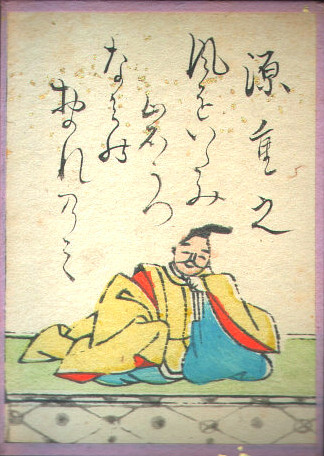
心あてに折らばや折らむ初霜の
置きまどはせる白菊の花
山里は冬ぞ寂しさまさりける
人目も草もかれぬと思へば
風をいたみ岩打つ波のおのれのみ
くだけてものを思ふころかな
憂かりける人を初瀬の山おろしよ
激しかれとは祈らぬものを

kokoro-ate ni
woraba ya woramu
hatsu-shimo no
oki-madohaseru
shira-giku no hana
Must it be by chance,
if I am to pluck one, that I pluck it?—
white chrysanthemums
on which the first frost
lies bewilderingly.
yama-zato ha
fuyu zo sabishisa
masarikeru
hito-me mo kusa mo
karenu to omoheba
In the mountain village,
it is in winter that my loneliness
increases most,
when I think how both have dried up,
the grasses and people’s visits.
kaze wo itami
iha utsu nami no
onore nomi
kudakete mono wo
omofu koro kana
Waves that beat against the rocks,
fanned by a fierce wind—
it is I alone
who breaks, those times
when I think of her!
ukarikeru
hito wo hatsuse no
yama-oroshi yo
hageshikare to ha
inoranu mono wo
“Make that heartless
woman, O mountain storm
of Hatsuse Temple—
crueller still!”—this is not
what I prayed for, and yet...
Track 12 - Chapter Ten - Tango Crimson (7 poems)
第十章 紅のタンゴ(七首)
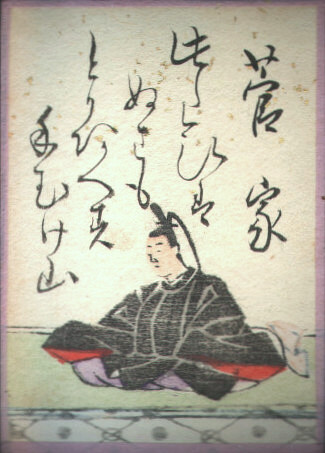
これやこの行くも帰るも別れては
知るも知らぬもあふ坂の関
このたびは幣も取りあへず手向山
紅葉の錦神のまにまに
小倉山峰の紅葉葉心あらば
いまひとたびのみゆき待たなむ
山川に風のかけたるしがらみは
流れもあへぬ紅葉なりけり
朝ぼらけ宇治の川霧たえだえに
あらはれわたる瀬々の網代木
契りおきしさせもが露を命にて
あはれ今年の秋もいぬめり
ちはやぶる神代も聞かず竜田川
からくれなゐに水くくるとは

kore ya kono
yuku mo kaheru mo
wakaretsutsu
shiru mo shiranu mo
afusaka no seki
This it is!
That going, too, and coming, too,
continually separating,
those known and those unknown,
meet at the Barrier of Ōsaka.
kono tabi ha
nusa mo tori-ahezu
tamuke-yama
momijhi no nishiki
kami no mani-mani
This time around
I couldn’t even bring sacred streamers
—Offering Hill—
but if this brocade of autumn leaves
is to the gods’ liking...
wogura-yama
mine no momijhi-ba
kokoro araba
ima hito-tabi no
mi-yuki matanamu
O autumn leaves
on the peak of Ogura Hill,
if you have a heart,
I would that you would waitv
for one more royal progress.
yama-gaha ni
kaze no kaketaru
shigarami ha
nagare mo ahenu
momijhi narikeri
Ah, the weir
that the wind has flung
across the mountain streamv
is the autumn foliage that
cannot flow on, even though it would.
asaborake
ujhi no kaha-giri
tae-dae ni
arahare-wataru
se-ze no ajiro-gi
As the winter dawn
breaks, the Uji River mist
thins in patches and
revealed, here and there, are
all the shallows’ fishing-stakes.
chigiri-okishi
sasemo ga tsuyu wo
inochi nite
ahare kotoshi no
aki no inumeri
Depending with my life
on promises that fell thick
as dew on sasemo plants—
alas! the autumn of this year too
seems to be passing.
chihayaburu
kami-yo mo kikazu
tatsuta-gaha
kara-kurenawi ni
midzu kuguru to ha
Unheard of
even in the legendary age
of the awesome gods:
Tatsuta River in scarlet
and the water flowing under it.
Track 13 - Chapter Eleven - Waiting for the Full Moon (8 poems)
第十一章 月は宵まち(八首)
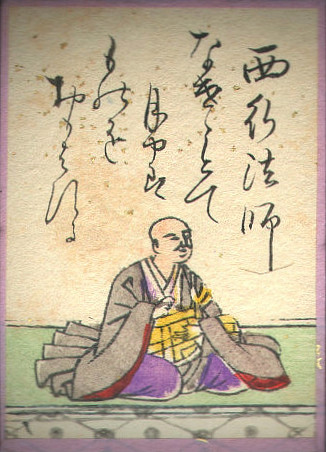
これやこの行くも帰るも別れては
知るも知らぬもあふ坂の関
今来むといひしばかりに長月の
有明の月を待ち出でつるかな
心にもあらで憂き世に長らへば
恋しかるべき夜半の月かな
ほととぎす鳴きつる方をながむれば
ただ有明の月ぞ残れる
秋風にたなびく雲のたえ間より
漏れ出づる月の影のさやけさ
嘆けとて月やはものを思はする
かこちがほなるわが涙かな
天の原ふりさけ見れば春日なる
三笠の山に出でし月かも
朝ぼらけ有明の月と見るまでに
吉野の里に降れる白雪

natsu no yo ha
mada yohi nagara
akenuru wo
kumo no idzuko ni
tsuki yadoruramu
The short summer nights:
while it seems yet early evening,
it has already dawned, butv
where in the clouds, then,
does the moon lodge, I wonder?
ima komu to
ihishi bakari ni
naga-tsuki no
ariake no tsuki wo
machi-idetsuru kana
It was only because you said
you would come right away
that I have waited these long months, till even
the wan morning moon has come out.
kokoro ni mo arade uki yo ni nagaraheba kohishikarubeki yoha no tsuki kana
Though it is not what’s in my heart,
if in this world of pain
I should linger, then
no doubt I shall remember fondly
the bright moon of this dark night!
hototogisu
nakitsuru kata wo
nagamureba
tada ariake no
tsuki zo nokoreru
The hototogisu:
when I gaze out towards where
he was singing,
all that remains is the moon,
pale in the morning sky.
aki-kaze ni
tanabiku kumo no
tae-ma yori
more-idzuru tsuki no
kage no sayakesa
From between the breaks
in the clouds that trail
on the autumn wind
leaks through the moon-
light’s clear brightness!
nageke tote
tsuki ya ha mono wo
omohasuru
kakochi-gaho naru
wa ga namida kana
“Lament!” does it say?
Is it the moon that makes me
dwell on things?—No, and yet,
look at the tears flowing down
my reproachful face!
ama no hara
furi-sake-mireba
kasuga naru
mikasa no yama ni
ideshi tsuki kamo
As I gaze out, far
across the plain of heaven,
ah, at Kasuga,
from behind Mount Mikasa,
it’s the same moon that came out then!
asaborake
ariake no tsuki to
miru made ni
yoshino no sato ni
fureru shira-yuki
So that I thought it
the light of the lingering moon
at dawn—
the white snow that has fallen
on the village of Yoshino.
Track 14 - Chapter Twelve - Longing (4 poems)
第十二章 人の恋しき(四首)
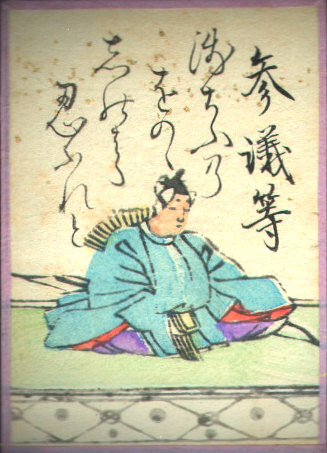
浅茅生の小野の篠原忍ぶれど
あまりてなどか人の恋しき
名にし負はば逢坂山のさねかづら
人に知られで来るよしもがな
人はいさ心も知らずふるさとは
花ぞ昔の香に匂ひける
誰をかも知る人にせむ高砂の
松も昔の友ならなくに

asajhifu no
ono no shinohara
shinoburedo
amarite nado ka
hito no kohishiki
Though I reveal my love
as sparingly as the sparse reeds
that grow in low bamboo fields,
it overwhelms me—why is it
that I must love her so?
na ni shi ohaba
afusaka-yama no
sanekadzura
hito ni shirarede
kuru yoshi mogana
If they bear such names:
the “come-sleep vine” of
“Meeting-Slope Hill”—
how I wish there was a way to come to you,
as if pulling in a vine, unknown to others.
hito ha isa
kokoro mo shirazu
furu-sato ha
hana zo mukashi no
ka ni nihohikeru
With people, well,
you can never know their hearts;
but in my old village
the flowers brightly bloom with
the scent of the days of old.
tare wo ka mo
shiru hito ni semu
takasago no
matsu mo mukashi no
tomo naranaku ni
Whom, then, shall I have
as someone who knows me—
since even the ancient pines
of Takasago
are not friends from my past?
Track 15 - Chapter Thirteen - Heavenly Breeze (3 poems)
第十三章 天つ風(三首)
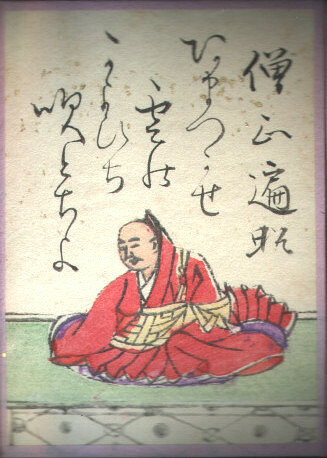
天つ風雲の通ひ路吹きとぢよ
乙女の姿しばしとどめむ
花さそふ嵐の庭の雪ならで
ふりゆくものはわが身なりけり
高砂の尾の上の桜咲きにけり
外山のかすみ立たずもあらなむ

amatsu kaze
kumo no kayohi-jhi
fuki-tojhiyo
wotome no sugata
shibashi todomemu
O heavenly breeze,
blow so as to block
their path back through the clouds!
For I would, if but for a moment,
detain these maidens’ forms.
takasago no
wonohe no sakura
sakinikeri
toyama no kasumi
tatazu mo aranamu
Above the lower slopes
of the high mountains, the cherries
have blossomed!
O, mist of the near mountains,
how I wish you would not rise!
Track 16 - Chapter Fourteen - Enduring Love (7 poems)
第十四章 忍ばれど君がため(七首)
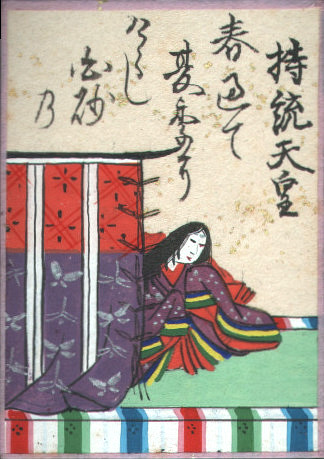
忍ぶれど色に出でにけりわが恋は
ものや思ふと人の問ふまで
逢ひ見てののちの心にくらぶれば
昔はものを思はざりけり
君がため春の野に出でて若菜摘む
わが衣手に雪は降りつつ
月見ればちぢにものこそ悲しけれ
わが身ひとつの秋にはあらねど
筑波嶺の峰より落つるみなの川
恋ぞ積もりて淵となりぬる
みかの原わきて流るるいづみ川
いつ見きとてか恋しかるらむ
春過ぎて夏来にけらし白妙の
衣干すてふ天の香具山

shinoburedo
iro ni idenikeri
waga kohi ha
mono ya omofu to
hito no tofu made
Even though I hide it,
it shows all over my face,
such is my longing,
so that people ask me
“What are you thinking about?”
ahi-mite no
nochi no kokoro ni
kurabureba
mukashi ha mono wo
omohazarikeri
When compared to
the feelings in my heart
after we’d met and loved,
I realize that in the past
I had no cares at all.
kimi ga tame
haru no no ni idete
waka-na tsumu
wa ga koromo-de ni
yuki ha furitsutsu
For my lord’s sake
I went out into the fields of spring
to pick young greens
while on my robe-sleeves
the snow kept falling and falling.
tsuki mireba
chi-jhi ni mono koso
kanashikere
wa ga mi hitotsu no
aki ni ha aranedo
When I look at the moon
I am overcome by the sadness
of a thousand, thousand things—
even though it is not Fall
for me alone.
tsukuba-ne no
mine yori otsuru
mina no kaha
kohi zo tsumorite
fuchi to narinuru
Like the Mina River
that falls from the peak
of Mount Tsukuba,
so my longing has collected
and turned into deep pools.
mika no hara
wakite nagaruru
idzumi-kaha
itsu miki tote ka
kohishikaruramu
Like Izumi River
that wells up and flows,
dividing the Moor of Urns—
when did I see her, I wonder,
that I should yearn for her so?
haru sugite
natsu kinikerashi shiro-tahe no
koromo hosu tefu
ama no kagu-yama
Spring has passed, and
summer has arrived, it seems.
Heavenly Mount Kagu
where, it is said, they dry robes
of the whitest mulberry!
Track 17 - Chapter Fifteen - Lonesome Sleep (9 poems)
第十五章 独りかも寝む(九首)
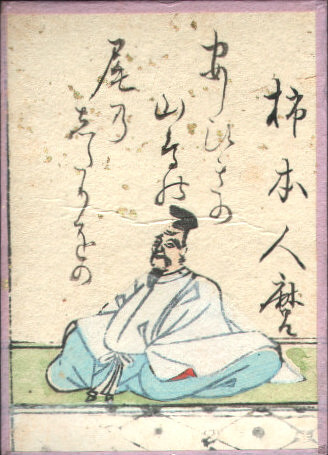
あしびきの山鳥の尾のしだり尾の
ながながし夜をひとりかも寝む
奥山に紅葉踏み分け鳴く鹿の
声聞く時ぞ秋は悲しき
瀬をはやみ岩にせかるる滝川の
われても末に逢はむとぞ思ふ
鵲の渡せる橋に置く霜の
白きを見れば夜ぞ更けにける
淡路島通ふ千鳥の鳴く声に
いく夜寝覚めぬ須磨の関守
人も愛し人も恨めしあぢきなく
世を思ふゆゑにもの思ふ身は
世の中よ道こそなけれ思ひ入る
山の奥にも鹿ぞ鳴くなる
きりぎりす鳴くや霜夜のさむしろに
衣かたしきひとりかも寝む
百敷や古き軒端のしのぶにも
なほ余りある昔なりけり

ashi-biki no
yama-dori no wo no
shidari-wo no
naga-nagashi yo wo
hitori kamo nemu
Must I sleep alone
through the long autumn nights,
long like the dragging tail
of the mountain pheasant
separated from his dove?
oku-yama ni
momijhi fumi-wake
naku shika no
kowe kiku toki zo
aki ha kanashiki
When I hear the voice
of the stag crying for his mate
stepping through the fallen leaves
deep in the mountains—then is the time
that autumn is saddest.
se wo hayami
iha ni sekaruru taki-gaha no
warete mo suwe ni
ahamu to zo omofu
Because the current is swift,
even though the rapids,
blocked by a boulder,
are divided, like them, in the end,
we will surely meet, I know.
kasasagi no
wataseru hashi ni
oku shimo no
shiroki wo mireba
yo zo fukenikeru
When I see the whiteness
of the frost that lies
on the bridge the magpies spread,
then do I know, indeed,
that the night has deepened.
ahajhi shima
kayofu chidori no
naku kowe ni
iku yo ne-zamenu
suma no seki-mori
The crying voices
of the plovers who visit
from Awaji Island—
how many nights have they awakened him,
the barrier-keeper of Suma?
hito mo woshi
hito mo urameshi
ajhikinaku
yo wo omofu yuwe ni
mono-omofu mi ha
People seem dear and
people also seem hateful
when vainly
I brood about the world—
this self who broods about things.
yo no naka yo
michi koso nakere
omohi-iru
yama no oku ni mo
shika zo naku naru
Within this world there is, indeed, no path!
Even deep in these mountains I have entered, heart set, I seem to hear the deer cry!
kirigirisu
naku ya shimo-yo no
sa-mushiro ni
koromo kata-shiki
hitori ka mo nemu
When the crickets
cry in the frosty night,
on the cold reed-mat,
spreading out my robe just for one,
must I sleep all alone?
momoshiki ya
furuki noki-ba no
shinobu ni mo
naho amari aru
mukashi narikeri
The hundredfold palace!
even in the shinobu grass
on its old eaves,
I find a past for which
I long yet ever more.
Chapter Fifteen: Lonesome Sleep
第十五章:ひとりかもねむ
和歌うた - 百人一首
「和歌」とは、五・七・五・七・七の合計31文字を使って表す日本古来の詩の形である「短歌」のことです。
このCDのテーマ『小倉百人一首』は、公家の歌人である藤原定家が鎌倉時代初期に、6世紀から12世紀にかけて生きた百人の優れた歌人の歌を一人一首ずつ選んで編纂した歌集です。それぞれの歌は、もっとも古い歌人を一番に、時代順に番号が付けられています。『小倉百人一首』は今では選歌集としてより、お正月のかるた遊びとして親しまれています。
About Wakauta - Hyakunin Isshu
Waka, ‘short poem‘ in translation, is a genre of classical Japanese poetry consisting of five units usually with a pattern of 5-7-5-7-7, for a total of 31 syllables. Uta means both poem and song in Japanese and is a play on word by Sanae Nene.
Ogura Hyakyhin Isshu or, in short, Hyakunin Isshu, is an anthology of classical Japanese poetry compiled in the 13th century by famed poet Fujiwara no Teika.
Hyakunin Isshu means literally ‘one hundred people, one poem [each]’. The poems in the anthology were composed by one hundred great poets from the ancient Nara Period (8th century) to the early Kamakura Period (12th century) and were complied in chronological order.
The editor of the anthology, Fujiwara no Teika (1162-1241), is a Japanese anthologist, calligrapher, literary critic, novelist, poet, and scribe of the late Heian and early Kamakura periods. He is considered to be of the greatest poets of his age. Ogura is the name of the villa where Teika was living when he compilied the anthology.
The Hyakunin Isshu was developed into a card game and popularized in the 17th - 18th century in the Edo Period. People still enjoy playing the card game as an activity when celebrating the New Year.
早苗ネネ
1968年、じゅん&ネネで歌手としてデビュー。
『愛するってこわい』が大ヒットし、一躍アイドルになる。
1972年に解散のあと単身渡英。 帰国後、しばらく音楽活動を続けたが、自然のなかで暮らしたいと生活の場を八丈島に移す。
1999年マウイ島に渡り、ハワイ大学マウイ・コミュニティ・カレッジに入学。
学期末の課題として、即興で和歌にメロディをつけて歌うパフォーマンスをしたことをきっかけに、万葉集、百人一首、古事記などから選んだ和歌にオリジナルのメロディをつけ、歌いはじめる。
2002年、CDアルバム『和歌うた・花のいろは』を制作発表。
以降、日本各地の寺社仏閣で和歌うたのコンサートを催す活動を始める。
2016年、百の和歌すべてにメロディをつけ17曲にまとめたCDアルバム『和歌うた・小倉百人一首』を制作発表。
現在も、ライワークとしての和歌うたを歌い広めている。
Sanae Nene
Began singing from early age. The first record ‘Kawaii Hana’ was released in 1965. 1968 Formed pop duo ‘June & Nene’ and released ‘Aisurutte Kowai’ which sold 800,000 copies.
1972 The duo was dissolved and she went to England.
After return, she branched out to different musical expressions but decided to move away from the music scene and moved to Hachijo Island to live close to the nature.
1999 Moved to Maui and enrolled in the University of Hawaii Maui Community College.
When she performed an improvisational singing by creating melodies to Japanese classical waka poems as a school assignment of the free expression, she was inspired and saw her potential lifework in musically working with waka poems.
She started exploring the world of waka in ‘Manyoshu’, “Ogura Hyakunin Isshu’ and ‘Kojiki’, writing music and turned those poems into songs.
2002 ‘Wakauta - Hana no Iroha’ -her first collection of songs of waka was released.
Since its release, she began a series of wakauta concerts in various temples and shrines, which are associated with the poems that she made into songs.
2016 After sixteen years since she began her wakauta journey, she completed to turn one hundred poems of the classic compendium of poems ‘Hyakunin Isshu’ into songs and created an album ‘Wakauta – Ogura Haykunin Isshu’.
She has been actively singing and sharing her enthusiasm of wakauta, which she pursues as her lifework.